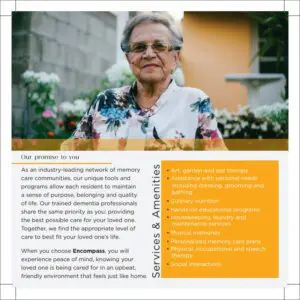Memory care facilities are designed to address the needs of people with Alzheimer’s and other types of dementia. Trained professionals make up the teams at memory care facilities and offer their support to residents to help minimize confusion, agitation, and other dementia-related health issues.
If you are considering a memory care facility for your loved one, you may want to do some research beforehand. In this blog, we will go over common questions to help you know what to expect in a memory care facility. We will also provide some tips on choosing the right facility for your loved one.
Contents
What Is A Memory Care Facility?
 A memory care facility is a type of long-term care facility that specializes in caring for people with Alzheimer’s disease, dementia, and other memory impairments. Memory care communities are usually a part of a larger assisted living community or nursing home, but some stand-alone facilities also exist.
A memory care facility is a type of long-term care facility that specializes in caring for people with Alzheimer’s disease, dementia, and other memory impairments. Memory care communities are usually a part of a larger assisted living community or nursing home, but some stand-alone facilities also exist.
Memory care facilities offer 24-hour supervision and assistance with activities of daily living such as bathing, dressing, eating, and using the restroom. Most memory care facilities also offer cognitive and social activities designed to stimulate the mind and provide a sense of purpose. These activities may include arts and crafts, music therapy, pet therapy, exercise classes, cooking classes, and more.
How Much Does A Memory Care Facility Cost?
The cost of a memory care facility will vary depending on the location, size, and amenities of the facility. In general, memory care facilities cost more than assisted living communities or nursing homes.
What Are The Different Types Of Memory Care Facilities?
There are three main types of memory care communities: small group homes, specialized Alzheimer’s units within larger assisted living communities or nursing homes, and stand-alone memory care units.
Small group homes are typically houses that have been converted into residences for six to ten people with dementia. These homes offer a more home-like environment and allow residents to live in smaller groups.
Specialized Alzheimer’s units are separate areas within an assisted living community or nursing home that provide extra security and supervision for residents with dementia. These units typically have their own activities and programming designed specifically for people with dementia.
Stand-alone memory care facilities are purpose-built residences that provide care and services exclusively to people with Alzheimer’s disease and other forms of dementia. These facilities often have a higher staff-to-resident ratio and more robust programming and activities.
 As an industry-leading network of memory care communities, our unique tools and programs allow each resident to maintain a sense of purpose, belonging and quality of life. Our trained dementia professionals share the same priority as you: providing the best possible care for your loved one. Together, we find the appropriate level of care to best fit your loved one’s life.
As an industry-leading network of memory care communities, our unique tools and programs allow each resident to maintain a sense of purpose, belonging and quality of life. Our trained dementia professionals share the same priority as you: providing the best possible care for your loved one. Together, we find the appropriate level of care to best fit your loved one’s life.
When you choose Encompass, you will experience peace of mind, knowing your loved one is being cared for in an upbeat, friendly environment that feels just like home. Our communities are specifically designed to create a safe and stimulating environment for those living with dementia.
Our open-concept encourages our residents to become involved in the daily rhythm of life in our community. Relax in the comfort of our gorgeous apartments which promote independence while providing safety and peace of mind for your loved one. We are confident that you will feel welcomed at any of our seven communities.
Download Free Memory Care Brochure
What To Expect In A Memory Care Facility
No matter what type of memory care facility you choose, there are certain things you can expect in terms of care and services. These things include the following:
24-hour supervision and security
One of the things you can expect in a memory care community is 24-hour supervision and security. This means that there will always be someone on staff who can help your loved one in case of an emergency.
Memory care facilities have been designed this way because residents often wander off or get lost. Having someone on staff at all times helps ensure that residents are safe and accounted for.
Higher staff-to-resident ratio
Another thing you can expect in a memory care community is a higher staff-to-resident ratio than what you would find in a traditional nursing home. This is because memory care facilities provide more individualized care to residents. More individualized care for residents is necessary because they often need more help with activities of daily living, such as eating and bathing.
Robust programming and activities
In addition to the higher staff-to-resident ratio, you can also expect more robust programming and activities in a memory care facility. This is because these facilities understand the importance of keeping residents engaged and active.
Therefore, memory care communities typically offer more structured activities, such as arts and crafts, music therapy, and pet therapy. These activities are designed to help residents with dementia or Alzheimer’s disease retain their cognitive abilities.
Structured environment
Another thing you can expect in a memory care facility is a more structured environment. This is because residents need routine and structure to help them feel safe and secure. Therefore, memory care facilities have set activities and mealtimes. These activities and mealtimes are designed to help residents feel a sense of purpose and improve their quality of life.
Specialized care
You can expect memory care facilities to provide specialized dementia care. This is because memory care is a specific type of long-term care designed to meet the unique needs of people with Alzheimer’s disease, dementia, and other cognitive impairment.
Meals and snacks
Another thing you can expect in a memory care facility is meals and snacks.
For people living with dementia, dining can be challenging. Many people with dementia are finicky eaters, while others have difficulty discerning colors, temperatures, and plate boundaries. Chewing and swallowing may eventually be compromised, along with the ability to hold a glass or handle utensils. Staff members serve meals 3 times a day so family members can rest easy knowing their loved one is being taken care of.
Most memory care facilities have a set menu, but some may allow residents to choose from various options. This allows residents to get the nutrients they need while also providing them with a sense of control.
Specially trained staff
Finally, you can expect the staff at memory care facilities to be specially trained to deal with dementia-related behaviors. This training helps the staff to better understand how to communicate with and care for residents with dementia or memory loss.
If you’re considering a memory care facility for yourself or a loved one, then be sure to keep these things in mind. Memory care can be an excellent option for those who need specialized care.
How To Choose A Memory Care Facility For My Loved One
When choosing a memory care facility for your loved one, it’s important to tour the facility and ask the right questions. This will help you get a better understanding of what to expect from the facility.
Some questions you may want to ask include:
- What is the staff-to-resident ratio?
- What type of training do the staff members receive?
- What type of programming and activities does the facility offer?
- How does the facility handle medication management?
- What is the admission process like?
- What is the discharge process like?
- Is there a waiting list for admission?
- What are the visiting hours?
- Can family members stay overnight?
- How many meals/snacks are provided?
Choosing the right memory care community for your loved one is an important decision. By taking the time to tour the facility and ask questions, you can be sure that you’re making the best decision for your loved one’s care. After all, you want them to be safe, comfortable, and have the best quality of life possible.
There are also some things that you can check yourself such as:
Physical environment
You need to inspect the property to make sure that it is safe and clean. This includes making sure that there are no trip hazards, the building is well-lit, and that there are security measures in place. This way, you can be sure that your senior loved ones will be safe while they are living in the facility.
Staff
You’ll want to meet with the staff to get a feel for their personalities and how they interact with the residents. Do they seem compassionate and patient? Do they seem like they’re properly trained to deal with memory care patients? If you answer “yes” to these questions after observing the staff, then you can feel good about leaving your loved one in their care.
Other residents
It’s important to see how the current residents are doing. Are they well-fed and groomed? Do they seem happy and engaged in activities? Or do they seem bored and isolated? By observing the current residents, you can get a good idea of what the overall atmosphere is like in the facility.
The facilities
Are the facilities clean and well-maintained? Is there plenty of space for residents to move around? Are there areas where residents can socialize with each other? These are all important factors to consider when choosing a memory care facility. After all, you want to make sure that your loved one will be well-cared for and happy in their new home. You can find the perfect memory care facility for your needs with a little research.
 The activities for residents
The activities for residents
You also need to consider what kinds of activities are available for residents. A good memory care facility will offer various activities to keep residents engaged and active. This can include arts and crafts, music therapy, exercise classes, and more. It’s important to find a facility that offers a wide range of activities so that your loved one can find something they enjoy.
The food served
The food being served is also an important consideration. A memory care facility should provide nutritious and well-balanced meals for residents. The facility should also be able to accommodate any dietary restrictions or allergies that your loved one may have. This way, you can be sure that your loved one is getting the nourishment they need.
Don’t hesitate to ask questions about the facility. You should feel 100% comfortable with the staff and the level of care that is being provided. If you have any concerns, be sure to bring them up with the staff.
How Memory Care Facilities Promote Better Health Outcomes For Residents
Memory care facilities provide a safe and supportive environment for residents with Alzheimer’s disease or other forms of memory loss or dementia. The staff is specially trained to deal with the unique needs of these residents. They also work closely with families to provide support and education.
There are many benefits to living in a memory care facility. Residents have access to 24-hour supervision and care. They also benefit from social activities and support groups. These activities help keep residents active and engaged, which can improve their overall health.
Memory care facilities also provide a sense of community for residents. This can be beneficial for both mental and physical health. When people feel connected to others, they tend to be happier and healthier.
These are the ways that memory care facilities promote a positive environment for residents. If you or a loved one is considering memory care, be sure to ask about these things. You’ll want to make sure that the facility you choose is the right fit for your needs.
Final Thoughts
Memory care facilities can be a great option for those with dementia or Alzheimer’s disease. By doing your research, you can be sure that you are making the best decision for your loved one. Be sure to ask lots of questions and get to know the staff before making a final decision. With the right care, your loved one can live a happy and healthy life despite the restrictions of their disease. For information on Eden East’s memory care services please visit contact us at https://www.edeneastpa.com.


 The activities for residents
The activities for residents